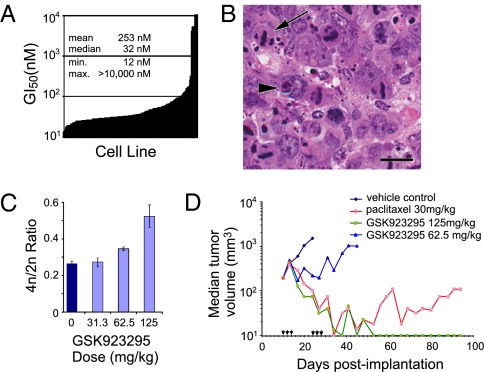Fig. 4.
Antitumor activity of GSK923295. (A) GSK923295 is a potent inhibitor of tumor cell growth in vitro (Dataset S1). Variation in GI50 values across 237 cell lines suggests intrinsic determinants of sensitivity. (B) Representative photomicrograph of an H&E-stained section of Colo205 tumor xenografts removed 24 h after a single injection of GSK923295 (125 mg/kg). (Scale bar: 20 μm.) GSK923295 induced appearance of mitotic figures consistent with CENP-E inhibition (arrow) and scattered apoptotic bodies (arrowhead). See Fig. S5 for comparison of vehicle control and GSK923295. (C) Dose-dependent increases in the ratio of 4n to 2n nuclei present in dispersed tumor tissue from Colo205 tumor xenografts 24 h after administration of the indicated doses GSK923925. (D) Dose-dependent antitumor activity of GSK923295 administered as three daily doses on 2 consecutive weeks (arrowheads) to mice bearing xenografts of the colon carcinoma cell line Colo-205. Among five animals treated with 125 mg/kg GSK923295, four experienced partial tumor regressions (PR), and one had a complete regression (CR); 62.5 mg/kg produced tumor-growth delay and no regressions. GSK923295 failed to produce detectable host toxicity at doses as high as 500 mg/kg; the maximal tolerated dose (MTD) in mice is unknown. Paclitaxel dosed at its MTD of 30 mg/kg produced regressions in four of five mice treated (2CR and 2PR). Similar results were obtained in several other tumor xenograft models (Table S4).

